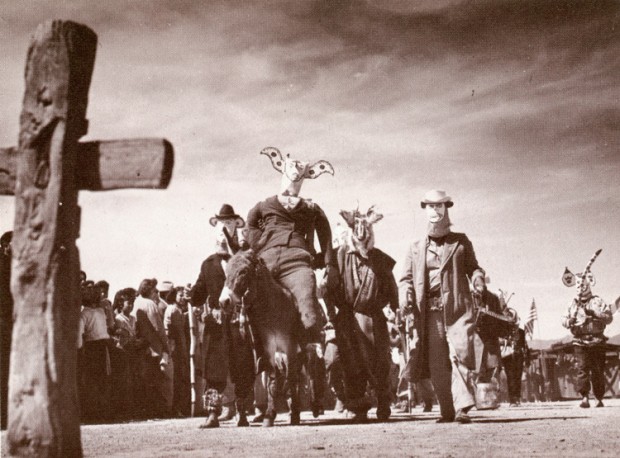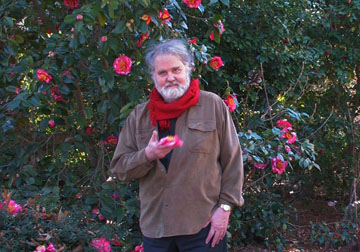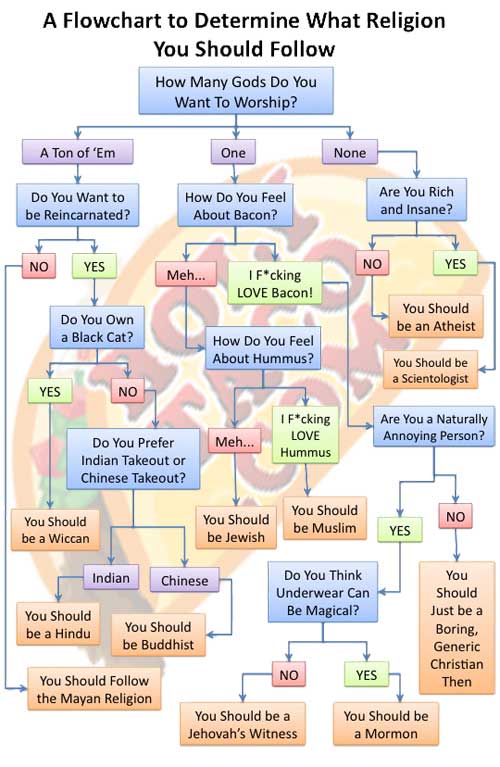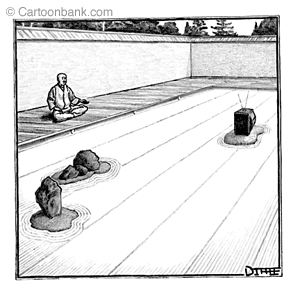Teaser for The Midnight Archive, a New Web Video Series Based Around the Event/Gallery Space Observatory, Brooklyn
Tag Archives: spirituality
Mining Under the Common Ground

Separate truths
It is misleading — and dangerous — to think that religions are different paths to the same wisdom [excerpt Boston.com April 25, 2010] Of course, those who claim that the world’s religions are different paths up the same mountain do not deny the undeniable fact that they differ in some particulars. Obviously, Christians do not go on pilgrimage to Mecca, and Muslims do not practice baptism. Religious paths do diverge in dogma, rites, and institutions. To claim that all religions are basically the same, therefore, is not to deny the differences between a Buddhist who believes in no god, a Jew who believes in one God, and a Hindu who believes in many gods. It is to deny that those differences matter, however. From this perspective, whether God has a body (yes, say Mormons; no, say Muslims) or whether human beings have souls (yes, say Hindus; no, say Buddhists) is of no account because, as Hindu teacher Swami Sivananda writes, “The fundamentals or essentials of all religions are the same. There is difference only in the nonessentials.”This is a lovely sentiment but it is untrue, disrespectful, and dangerous.
The gods of Hinduism are not the same as the orishas of Yoruba religion or the immortals of Daoism. To pretend that they are is to refuse to take seriously the beliefs and practices of ordinary religious folk who for centuries have had no problem distinguishing the Nicene Creed of Christianity from the Four Noble Truths of Buddhism from the Shahadah of Islam. It is also to lose sight of the unique beauty of each of the world’s religions. Stephen Prothero is a religion professor at Boston University. This article is adapted from his new book, ”God is Not One: The Eight Rival Religions That Run the World–and Why Their Differences Matter.”
This essay of Professor Prothero is amazing in a bad way. My criticism is simple: there’s a substantial and subtle literature concerned with the claim he’s arguing against, yet none of it enters into his argument. This huge hole swallows the glib attack he issues in this essay, an attack careless in its presentation of categories and domains, and, an attack launched against more than a few straw men.
It’s as if Prothero feels he can fool the discerning reader. Normally I would dig some and see if the author is through-and-through a charlatan. Here my guess is that he isn’t, but not from anything found in his intentionally misdirected essay.
He writes here about very intriguing questions. In comparing religions with one another, in what ways does this show similarities? What are those similarities about? Should the evidence show that some, or all, religions overlap in particular ways, are there, then, valid generalizations to be inferred from the specifics of any overlap?
Furthermore, such an inquiry about common features is itself framed by a variety of disciplines, and each brings different interpretive and discipline-bound practices to bear on the question. Outside of this there is also a worthy literature brought forth by non-academic experts, and, as well, there is also a long history of this very inquiry. One aspect of this history is that it evolved from the point where specific religions come into contact with each other, and thus was evoked by the curiosity of some religious persons about the possibility of commonality. This comes about long before the frameworks of modern academic disciplines existed.
It is also obvious: there is a fundamental issue begged by any theism, no matter how particularized a theism is in practice or by a its founding assumptions. This is simple to articulate: if there is a God of “All” is not this God then a God of all spirituality, irrespective of whether a particular spirituality is granted primacy or is heretical? In other words, if God of this sort does in fact exist, this God would ultimately be the God of religionist, heretic, and atheist alike. From this, if this is true, one would expect commonalities.
There are four modern perspectives, among many, which frame different possibilities for important, maybe crucial, inquiries into commonality. One is the Analytic Psychology, given by Carl Jung. Here spirituality is viewed as a phenomena of introspective consciousness. From this, (largely) personal religious experience and development is the nexus for an inquiry into, as-it-were, possibly like-minded objectives of self-realization. There is in this, a prospect that human consciousness, as a matter of its psychological constitution, in specific keys lights upon objectives that are similar or identical, yet only does this in the precise domains where this phenomena may exist, and this is located within these precise domains in specific religious traditions.
Two is the integral perspective on human development, given its most detailed elaboration by Ken Wilber; (and Wilber’s elaboration following mostly from the thoughtful work of Jean Gebser.) Integral thought expands the nexus of inquiry along a spectrum of developmental lines. Similar to Analytic Psychology, it is encumbered by fundamental assumptions about the universal nature of human aspiration. Taken as an outlook, (and “in-look,”) the Integral perspective provides a loose framework for investigating procedures for self-realization–procedures embedded in particular instrumentalities found in different spiritual and religious practices.
Third is anthropology, a modern discipline geared toward differentiation of human phenomena. Commonalities would be rigorously qualified and vigorously contested as a matter of methodology, yet, the idea that commonalities could be universal would remain a worthwhile anthropological hypothesis. This is especially so if such a hypothesis is unfolded in the context of evolutionary anthropology. Here the framing starts from the idea that religions may be dramatically different, but that human nature is not also wholly different.
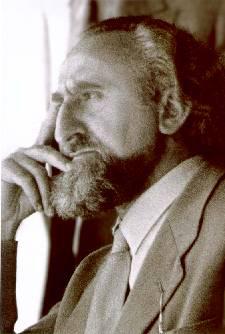
Fourth, and is the argument posed by Frithhof Schuon, and echoed by a specific ilk of traditionalists and (somewhat) outsider experts, such as Mercea Eliade, Joseph Campbell, Jacob Needleman, Rudolph Steiner, and others. Schuon described the over-arching aspect (and nexus for inquiry,) in the title of his book, The Transcendent Unity of Religion. I going to gloss the deep subtlety of Schuon’s argument and suggest his philosophical perspective basically holds this: where there is religion, there is also found a domain of aspirational practice where experience of the deep relationship between man and divine cosmos necessarily abides the idea that the cosmos is set up to evoke this relationship. It could be said the nexus of inquiry that necessarily follows from there being a God of All, is such–that a universality of religion in this aspirational domain is necessarily entailed by this primary assumption. Thus, given that there is a God of All and everything, we might expect to find similarities ordinated by God’s, if you will, “set up.”
(Schuon is superior to Karen Armstrong, with respect to being a source for beginning an inquiry at the abode of this nexus.)
***
Prothero doesn’t introduce any of these four vectors for inquiry into his didactic essay. For me, in not doing so, his argument is damaged out of the gate. If we break down the entire spectrum of human religious behavior, it could be incumbent upon an investigator to account for the behaviors oriented around the idea of the unity–in precise domains–of some/most/all religions.
But Prothero is mostly disingenuous in employing straw men and his attempt to wrangle an argument out of several category errors, the most grotesque of which is found in his silly statement, “To pretend that they are is to refuse to take seriously” (yada yada.) Since the point of finding similarity is to differentiate similarity from that which is dissimilar, there isn’t any ground to be gained by pretending that subtle arguments for similarity revolve around thinking different Gods (or theisms,) are said to be the same. This isn’t to say that there aren’t people who think this, its just that this is a definitive straw man.
(To the side of all this there is a contest of theisms. The ripe question for proponents of a distinctive theism within the context of the various Ambrahamic religions is simply enough, for example, ‘do you, as a Christian mystic pray to a different God than the God the Muslim prays to?’ In this the possibility of a negative answer holds another variation on the prime question about sameness and similarity. On the other hand, this is another way of wondering to what extent God owns a home team!)
The meta-inquiry is one concerned with a description, differentiation, and conceptualization of domains of human religious behavior and phenomena. This would work to tightly qualify the domains and then sort out apparent similarities. For me, anthropology, especially given the lens of an evolutionary framing, is the least inflicted by confirmation bias and tautological precepts. Still, Schuon and Dr. Jung opus, at a minimum, are worthwhile for their sophistication and depth, even if there is (for me) no slam dunk.
As it clearly appears when considering the fundamental question of the Divine Will as with other major instances of metaphysical exposition and spiritual expression, Schuon’s esoteric perspective can be best characterized as a science and discipline of objectivity that situates each reality at its own adequate ontological level and within its overarching metaphysical or cosmological context. In doctrinal as in methodical matters, Schuon’s thrust lies in a lucid perception of realities that considers both their metaphysical and archetypical meaning as well as the specificity of their plane of manifestation. Thus, in pure metaphysics, the esoterist avoids the pitfalls of confessional, anthropomorphic, and moralist expediency and sublimity by focusing on the dimensions, modes, and degrees of the theophanic unfolding of the Real. He does not confuse metaphysical realities with their partial or distorted contours as envisaged through human biases, nor does he project the limitations of human moral categories onto the Divine Order. At the same time, he perceives the roots of all spiritual, aesthetic, and moral phenomena in the Supreme, and he accounts for their meaning on the basis of the Divine, thereby describing the multileveled and multifaceted Unity of Being. In spiritual matters alike, esoterism reaches to the essential through the veil of superimpositions and accretions, while elucidating the partial legitimacy of mystical emphases, excesses, and subjective or collective detours. As such, esoterism is nothing less than the most direct and comprehensive language of the Self. jean-Baptiste Aymard-Patrick Laude, Frithof Schuon, life and Teaching; 2004 SUNY Press)
Filed under analytic(al) psychology, Kenneth Warren
Secrets Revealed
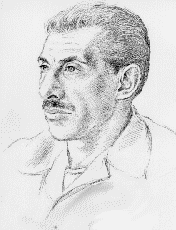
I noted recently via a google alert that lectures of Idries Shah, taken from a series of hard-to-obtain cassettes, have been made available on the web site, The Institute for the Study of Human Knowledge. Ishk.net is ostensibly the web of home of all things ‘Shah.’
The wikipedia article on I. Shah seems to me fair enough; and, I’ve been tracking his work for 20+ years. Shah, who departed the worldly coil at 72 years-of-age in 1996, was a controversial figure. His effort to promote in the west an accessible and cosmopolitan Sufi-inflected regimen for self-development and spiritual growth was the most notable among the several such original efforts which unfolded in the mid-sixties.
The controversies are many, yet I won’t go into them. This isn’t my purpose today. It’s enough to mention that Shah could be termed a neo-Sufi, whose project unhooked Sufism proper from it’s narrow traditions, and, whose own bona-fides remain murky. Still, during a time when Sufism itself was an exotic arrival on the nascent counter-cultural scene, Shah enjoyed patronage, was an entrepreneur, and, was a prolific writer. Any notoriety he gathered in didn’t prevent him from, for a time, becoming the face of Sufism–the foremost Sufi.
Sometime in the late eighties I worked part-time at a group home for the mentally disadvantaged. My boss, Jim, was surprised I had heard of Shah. Shah was Jim’s main man. He told me he had some tapes he wanted to loan me. He brought them in, a set in a box entitled if memory serves, Wisdom of the Secret. Shah reminded me of Alan Watts: great voice, humorous, compelling.
I must have listened to those eight tapes twenty times. I took to enjoying Shah’s books, especially favoring the many that contained teaching stories, including the series of books with the tales of Nasruddin. To this day, these materials penetrate my own sense of experiential learning. I have learned even the surface of some of the so-called story-based applications may provide surprising reconfigurations away from habit, cognitive error, blind spots, etc..
(Later, I became very interested in Shah’s career and its notorious moment as cultural ripple in a specific historical moment.)
Four of Shah’s lectures may be streamed or downloaded as mp3s. I’m familiar with them already because they first appeared as single cassettes. I recommend all of them. My favorite is Overcoming Assumptions That Inhibit Spiritual Development. From the intro,
So one must learn to be flexible, one must learn to question assumptions, one must learn to put up other assumptions than one’s customary ones to study things…some of the things are, for example, our narrative materials which I have published… Now various points of view on these produce a certain kind of flexibility. Trying too hard doesn’t work, trying to make out what they mean doesn’t work because this material is instrumental not indoctrination.
There’s also an interview in four parts on youtube.
Here’s Part One.
A year ago I put together the ten parts of other videos and posted it. I wrote then,
He was a walking library of Sufic esoteric material, yet, he also brought these traditional secrets to proto-new age stages in the sixties. He walked a weird razor’s edge in maintaining that these materials could retain their power even when stripped of their context, as long as the context of the user was precisely calibrated to these bare-of-context materials!
Video 48m Happy Nous Year
Groups & the Development of Consciousness
My colleague and friend Robert has asked in a comment to Sustainability, Systems Awareness & Eros,
“However saying that, I don’t know if the “group” consciousness actually manages to effect a real conscious change in both individuals and in groups. Are these things of the moment?”
Let’s just speak of a simple hypothesis: that a group is possibly a medium for an individual to increase their awareness. There are, in this, several things we’ll need to test the hypothesis.
One, we’ll need a developmental framework that can support both the proof of the hypothesis and its falsification.
Two, given this framework, we’ll need to employ explicit criteria to make a determination about both how to test and next evaluate the results of the test. And, finally we’ll need to grapple and grip with how to interpret the evaluation.
There’s a crucial distinction I’d like to introduce. A hypothesis of this sort is concerned with the development of consciousness of an individual within a group due to the unique opportunities for this development a group may instantiate. Yet this potential for development is not proposed as a positive result of group consciousness, but, rather, is the result of people bringing their personal consciousness to the medium of a group. In noting this, all I suggesting is that consciousness is only a property of individuals; that it would be very hard to characterize what is meant by group consciousness in any normative sense.
As it has come about–in modern psychology–short of defining a framework, there are concrete terms for characterizing the development of consciousness in the medium of a group. For example, these are some of the developments afforded by groups: better teamwork, closer coordination, acceptance of and mitigation of narcissistic and infantile needs, enhanced problem analysis and problem solving, better skills for discernment and differentiation, support for withdrawal of projections, etc.. and on and on.
Also, groups make possible at times the submission of self-oriented egoic impulses to higher orders of awareness, including facilitating recognition and ownership of the shadow. So it is, to use one broad developmental mode, that an individual in a group may leverage the means for increasing their emotional intelligence.
***
I believe all sorts of artistic teams in music and dance and theatre brings lots of unique developmental potential into being. These provide excellent examples, but so do all sorts of other common groups. One such group would be–at their best–the formal or informal classroom.
Of course, my sense here presumes that consciousness itself is not a mountain to be climbed, but instead operationalizes real world capabilities. In short, to become more able at anything poses a developmental increase.
The only move toward spiritualization, would be to suppose that all such developmental increases are qualities of higher consciousness given a timeworn notion of spiritual development–when those better capabilities do no harm.
ALICE & BOB

Swamini Turiyasangitananda Alice Coltrane passed January 14. She was one of the deeply beautiful human beings.
“In these kinds of times we live in now, with war, floods and fires, it is not unusual because they have been occurring throughout the ages. However, they are occurring now very evidently for us where we see and experience the pain and horror and suffering. . . for a good reason. There is always the polarity: the right side, the left side; the day side, the night side. We on one side see suffering and pain, but on the other side we see giving, we see kindness, we see sympathy. We see a humanity opening its heart, its spirit, and reaching out to those who are in pain. So what is happening now? We have to look at the total picture. The Lord wants us to be sympathetic, charitable, helpful and forgiving because, as was stated, mankind has to experience the truth of its humanity.â€

Robert Anton Wilson passed January 11.
“Of course I’m crazy, but that doesn’t mean I’m wrong.â€
“23 Artemis, 79 p.s.U.
I regard “ideology” and “morality” as the two most dangerous forces on this planet. About “ideology” I have expressed my suspicions elsewhere; here I will only mention John Adams’s verdict that shortening “ideology” to “idiocy” would save some space and add a great deal to clarity. He had the French Revolution in mind, but “ideologists” haven’t changed much since then, have they?
As for “morality” — or “moralic acid” as Nietzsche called it — I consider it the major cause of almost all the major atrocities not caused by “ideology.” This wonderful invention, “morality,” allows people — normal, ordinary people — to do things so cruel and violent that they could never bring themselves to do them for selfish reasons. What the sociopath and sadist do for fun, the “moralist” does on behalf of “duty” or “justice.”
“Morality,” today, allows Moslems to stone women to death, as it once fueled the Christian witch-hunts. “Morality” has excused every war, and glorified some of them. “Morality” constantly plots to subvert the Constitutional guarantee of free speech. “Morality” inspires gay-bashing and the bombing of women’s clinics. Why, without “morality” we might all suddenly go stark staring sane.
My vision of Utopia would include a hell of a lot more kindness and mercy than we have now, and a hell of a lot less “morality.”
Filed under psychology, Religion
IT WOULD TAKE A LOT OF TIME AND THOROUGH ATTENTION
I’m very curious about the process through which people really get to know each other. And, just as fascinated by the processes through which people fool themselves into believing they are getting to really know one other. There is overlap between the former and the latter kinds of processes. Some people are very good at both, but, a person who is good at getting to know another person is likely to well understand what the differences are between really knowing and surface knowing.
It’s tempting to insert here that it is a two-way street too, but, my experience is that there can be a significant differential between two approaches and how effective each, in actuality, is.
When engaged with other persons my common mode is research and participant/deep observer, so, at a minimum, I’m often sitting there being greatly amused by processes of interpersonal knowledge building. For example, it is often for me a case of observing how much interference there is in people’s attempts to be present, listen, respond, and, overall, apprehend what is going on. This goes for me too: reflecting on my own interference.
RENAMING & PREPARING TO PREPARE
I added the emphasis in the following clipping. …food for reflection. I’ll follow up with a teaching cartoon shortly.
Excerpt. The Wisdom of Sufic Humor, Idries Shah; originally published in Human Nature; April 1978
Sufis see many traditional prayers and processes, today more familiar than ever to most Westerners, as relics of specific, scripted, and measured formulas designed in the past to help people in the past to attain knowledge of the absolute and of their real selves. The existence of repetitious and automatistic chants, phrases, and dances was often pointed out by the Sufis in the past as being the ignorant perpetuation of formerly effective instruments. Technical knowledge, instead of being applied, tends to become sacroscant and used for a low level of autohypnosis and even ideological and community indoctrination: the very reverse of the original Sufic intention.
Sufis maintain that anyone who says that by prayer and exercise he or she will storm the gates of heaven is someone not prepared to prepare. Such an assault essentially tries to abolish the problem of intricacy by denying that it exists: It is like solving the problem of a missing button by sewing up the buttonhole.
Sufis do not stress the primacy of teaching, exercises, or dressing people in odd clothes. For the Sufis, humanity is already full of misconceptions and unsuitable, counterproductive habit patterns that must be attended to before there is a fair chance of progress toward a more objective understanding. “You must empty out the dirty water before you fill the pitcher with clean” is one of the ways they put it.
Since most people’s spiritual life is really their emotional-psychological-social life renamed, Sufis start with this aspect when trying to clear up the confusion that is the usual condition of most people’s minds.
Their natural allies are modern psychology and sociology, which have pointed out something similar. In the past, Sufis lacked the support of such parallel research and therefore often had to teach in secret. Hysteria was often considered sacred; monomaniacs were sometimes regarded as saints. Only recently have most societies accepted the idea that greed, say, is sure to be greed, even if it is greed for enlightenment; or that emotion, no matter what kind it is, may be harmful.
Sufis traditionally address themselves to the actual social-psychological situation, while those who do not understand the priorities clamor for “spiritual” teachings. Such teachings are useless if floated on top of the psychology of the ordinary individual, however useful that psychology is for limited purposes.
Sanctimoniousness, vanity, and self-will must be set aside in Sufi studies. For this reason, a person’s illusions of self-esteem may have to be deflated. Many people cannot endure such an approach, and the result is that some leave and set up synthetic Sufi systems, some turn against the Sufis, and some become servile because they mistake humility for self-abasement. A few, on the other hand, understand what is going on and profit from it. The Sufi has no responsibility to work with people who reject his attitude. In fact, he is incompetent to do so. This rejection is often unconscious, since many would-be learners in reality are seeking social stabilization, comfort, or attention, not knowledge and understanding.
Filed under adult learning, sufism
SOFTLY HARD PROBLEMS
Dana Gaynor’s The Journal of Psychospiritual Transformation has some fairly ‘hard’ minded articles about its subject matter. For example, on the contents page of vol.1 you’ll find an article by Charles Tart, “An Emergent Interactionist Understanding of Human Consciousness”. It exemplifies this qualification. On Tart’s site is the best itemization of credible parapsychology resources.
Andrew Cohen’s What Is Enlightenment magazine is good. It’s a bit beleaguered by single-mindedness. (My bias: you can’t praise the mysterium tremendum and also praise only one implied form of ultimate higher consciousness. Creative, ‘messy‘ awareness often gets tossed out in reductive, logos-centric framings of consciousness.)
Hard-mindedness, (a pun if you know what the hard problem is,) is one of the key thrusts of David Chalmer’s web compendium of papers and research on consciousness, the philosophy of psychology, mind, and neuroscience. He’s an editor of the very worthy virtual journal, Psyche.
The Science and Consciousness Review -obviously- is enthusiastically all over the map and includes what old hippy explorers would term research into the doors of perception.
Stephen Jones is behind The Brain Project, another site melding neuroscience and research into consciousness. There is an inviting section of multimedia presentations here.
Did I mention parapsychology earlier? Why yes! What about altered states of consciousness? Two fine resources: Rhea White’s Exceptional Human Experience site, and, TASTE:the archive of scientist’s transcendent experiences, I highly recommend.
Filed under science
STRAIGHT TO THE PLAYFUL HEART
In my trolling for items of interest, I happened upon a terrific resource, the web site of Yannis Karaliotas. He’s an explorer and scholar with very similar affinities to my own. His paper, “The Element of Play in Learning” is among the many keepers at his site. The subtitle to the paper is “The Role of Synergetic Playful Environments in the Implementation of Open and Distance Learning”. Yup.
Filed under adult learning

